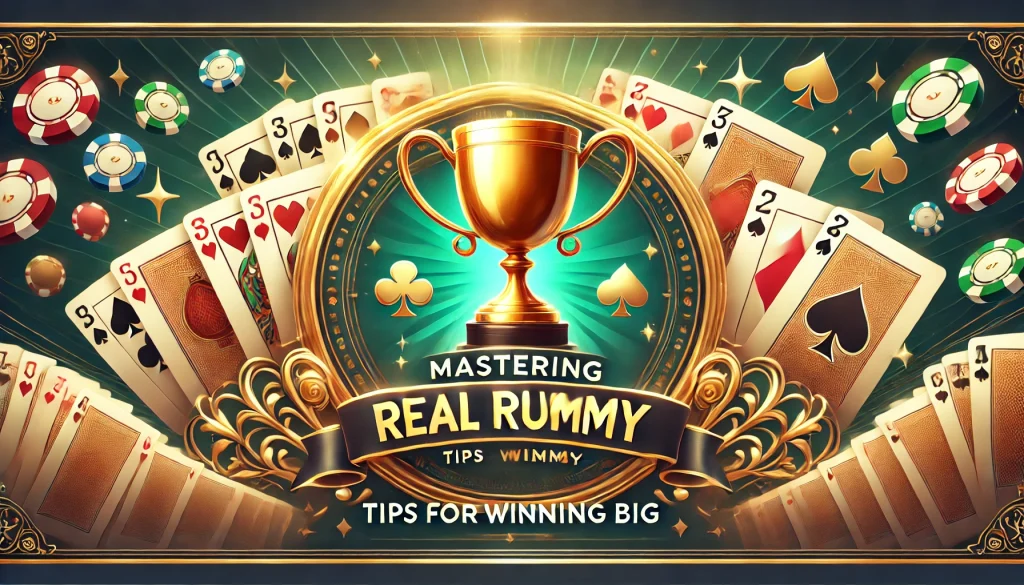Description

A Complete Guide to Mastering Rummy Rummy is a timeless card game that has enthralled players for many years. Because it combines skill, strategy, and a little bit of luck, it is popular with both casual and competitive players. Rummy requires not only an understanding of the rules but also the development of strong strategies, prudent hand management, and composure throughout play. This post explores the fundamentals of rummy and offers advice & strategies to improve your skills.
Rummy is fundamentally a card game in which players form sets and runs from a hand of cards. Merging cards into legitimate combinations—which can be runs (three or more consecutive cards of the same suit) or sets (three or four cards of the same rank)—is the fundamental goal. A certain number of cards are dealt to each player, & the remaining cards are arranged in a draw pile. The discard pile is started with one card face-up.
Players attempt to improve their hand by taking turns drawing from either pile and discarding a card. One player must successfully meld all of their cards to end the game. After that, there is a scoring phase in which points are determined by taking into account the cards that are still in the opponents’ hands.
Effective gameplay in Rummy requires an understanding of its subtleties. Rummy comes in a variety of forms, each with its own set of rules & scoring methods, including Indian Rummy and Gin Rummy. For example, in Indian Rummy, players must form at least two sequences, one of which must be a pure sequence devoid of a joker, while in Gin Rummy, players try to form melds while minimizing the value of unmelded cards. Gaining familiarity with these variations can have a big impact on your game performance and strategy.
A plan of attack. Players who want to play offensively should concentrate on making melds as fast as they can while monitoring possible combinations they can make with the cards they draw. This entails analyzing your own hand as well as speculating about which cards your opponents might find useful. For example, you might want to refrain from collecting cards of a certain suit if you see your opponent discarding those cards in order to keep them from finishing their melds.
Defense Plan. On defense, it’s critical to monitor which cards opponents are discarding. You can learn a lot about their tactics and modify your own by paying attention to the cards they pick up or discard.
If an opponent routinely discards high-value cards, for instance, it can mean they are about to win and you should play more cautiously. Strategies for Balancing. You will become a more formidable opponent at the table and increase your chances of winning if you can balance these offensive & defensive tactics. In Rummy, choosing which cards to keep and which to discard is one of the most important choices. If your opponents can use the discarded card to finish their melds, it may create opportunities for them.
Therefore, before choosing which cards to discard, it’s critical to evaluate each one’s potential value. For example, it might be prudent to keep a valuable card that doesn’t fit into any possible melds until you can decide if it can be used strategically later in the game. On the other hand, it’s just as crucial to know when to let go of specific cards. It might be time to throw away cards that don’t help your hand get better over a number of turns. When making this choice, you should carefully consider what your opponents might require.
Discarding less valuable cards that are unlikely to support an opponent’s strategy is usually preferable if you have reason to believe that a certain card could help them finish their melds. The secret to mastering Rummy is finding the right balance between keeping valuable cards and discarding ones that are no longer useful. In Rummy, wild cards and jokers are strong tools that, when used properly, can greatly increase your winnings. They are extremely versatile cards that can be used to form melds in place of any other card.
It’s critical to think about how to best use the joker in your hand as part of your strategy. For instance, you can finish a sequence faster by using a joker in a run rather than just natural cards. But it’s also critical to keep in mind that if jokers don’t help you improve your hand overall, holding onto them for too long may be harmful. Gaining an advantage in gameplay can also come from knowing when to use jokers defensively. Using a joker strategically can throw off an opponent’s plans if you see they are about to win and have been gathering particular cards.
Using a joker, for example, can help you improve your hand while keeping your opponent from finishing their melds if you have two cards that make up a run but need one more card that they are probably holding onto. Gaining proficiency with jokers and wild cards can eventually result in major gameplay advantages, but it takes time and planning. It’s important to pay close attention to what your opponents are doing in rummy. You can learn about their tactics & possible hands by paying close attention to their draws and discards.
An opponent may be nearing finishing their melds with particular cards they require if, for example, they routinely draw cards from the discard pile rather than the deck. You can use this information to guide your own choices regarding which cards to keep or discard. You can also predict your opponents’ next moves by keeping an eye on the kinds of melds they are creating. Avoid throwing away cards that you see an opponent is collecting from a specific suit or rank, or even think about keeping similar cards that might prevent them from moving forward. In Rummy, you can obtain a substantial edge by keeping an eye on your opponents’ tactics & modifying your own play accordingly.
Putting Your Hand in Order. It is possible to quickly determine which combinations are feasible and which cards require drawing or discarding when a hand is well-organized. Sorting your cards according to suit or rank, for example, can make it easier for you to see possible runs or sets. Keeping Your Options Open.
Also, it’s equally critical to keep your strategy flexible. Your original plans might need to be modified in light of the changing dynamics at the table as new cards are drawn & discarded during the game. Making a rapid turn. You will remain competitive if you can quickly change your strategy if you discover that certain combinations are no longer viable because of the actions of your opponents or new draws. It takes organization & flexibility to manage hands effectively, and these are abilities that can be developed with practice and experience.
Moments of pressure & high stakes can make rummy a very intense game. Making wise choices and carrying out plans successfully during these crucial times require maintaining composure. When faced with difficult decisions, like whether to draw from the discard pile or take a chance on the deck, maintaining composure enables you to consider your options logically rather than giving in to anxiety-driven impulsive decisions.
Developing a patient and resilient mindset can also improve your overall gaming experience. It’s easier to deal with frustration when things don’t go as planned when you realize that not everything will work out for you. Instead of obsessing over errors or lost chances, concentrate on taking what you’ve learned from each game and using it in subsequent rounds. In addition to helping you make better decisions, maintaining composure at the table conveys confidence and may frighten opponents who might be emotionally driven. Like any skill-based game, rummy requires consistent practice to get better.
Playing frequently enables you to practice making decisions, try out various tactics, & improve your ability to read your opponents’ moves. Whether playing online against different opponents or with friends, every session offers insightful information about what works and what doesn’t. Also, examining previous games can also greatly aid in skill development. By thinking back on your gameplay choices, both good and bad, you can spot trends in your approach that might require modification.
You can approach future games with more clarity & confidence if you think about taking notes on particular hands or circumstances where you felt unsure. Over time, you will be able to improve your Rummy skills significantly with consistent practice and careful analysis. In summary, mastering Rummy necessitates a multidimensional strategy that includes knowing the rules, creating winning plans, effectively managing your hand, and remaining composed under duress.
You can improve your performance and take full advantage of this classic card game by continuously practicing these skills & watching how others play as well as yourself. These tips will help you become a proficient Rummy player, whether you’re playing for fun with friends or competing in more competitive settings.


